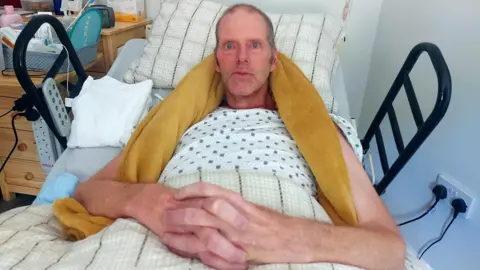Tim Hull, a 56-year-old man with a notable history of accomplishments, is currently facing an emotional and health crisis that has led him to make the heart-wrenching decision to cease his life-saving medication. Residing in Worcester, Tim has experienced a significant decline in health over the last two years due to a rare neurological condition known as Hereditary Spastic Paraplegia (HSP). This condition, coupled with another hereditary ailment called polycystic kidney disease, has left him bedridden since February of this year.
Despite having a remarkable past, including running a successful handyman business and earning a place in the Guinness Book of Records as one of the UK’s tallest twins, Tim’s current quality of life is alarmingly low. His struggles are not merely health-related, but also stem from the ongoing battle to access the medical and care support he desperately needs. Tim describes feeling abandoned by health professionals, who have moved him between various waiting lists without providing adequate care or necessary equipment.
In February, Tim made the difficult choice to stop taking his kidney medication, which has resulted in his kidneys beginning to fail. He recognizes the grim situation; if he does not resume his medication, he could have months left to live. In his words, stopping his medication felt like a rational decision, as he described the agony of being confined to his bed without hope for improvement. His distress underscores a broader issue faced by many within the National Health Service (NHS), where lengthy delays and insufficient support can lead individuals like Tim to feel that life is no longer bearable.
The experiences Tim has gone through resonate with numerous families who have reached out to BBC News, sharing their struggles in accessing necessary health care services. Over 250 families with serious ailments have detailed their frustrations over long waiting times for assessments, appointments, and vital equipment that could help them manage their conditions at home. They have shared feelings of being lost in a bureaucratic maze, where the healthcare system seems more inclined to respond during crises rather than proactively address their needs.
Tim’s journey through the healthcare system has been fraught with obstacles. After initially visiting his GP in 2022 due to mobility issues, he was sent on a convoluted path of referrals, enduring long waits only to find out he was being sent to the wrong specialists. The delays have resulted in a significant deterioration in his health, culminating in the loss of his ability to walk and the necessity for a wheelchair.
Moreover, Tim’s height, at 6 feet 10 inches, has added to the challenges. The standard care and equipment provided by the NHS failed to accommodate his size, resulting in discomfort and even safety risks. Despite Tim’s considerable needs and the efforts of his sister, Sue, to advocate for him, the struggle to secure appropriate care has been described as a relentless uphill battle.
Tim’s plight shines a light on the systemic flaws in the NHS, especially regarding the care provided to individuals with complex needs. Sue, who has been an unwavering support for her brother throughout this ordeal, has expressed her frustration at the disjointed nature of care services, stating that the transitions between care providers often lack coordination.
Recently, Tim has been in touch with a local hospice, which has been pivotal in managing his pain and supplying vital information he previously lacked. The hospice has facilitated the arrangement of funding for necessary care visits and psychological support to help evaluate Tim’s decision-making capacity regarding his end-of-life choices.
Despite the hospice’s assistance, Tim and Sue stress that the overarching care provided is still insufficient. They highlight the painful irony of needing to consider end-of-life care in order to receive the support that should have been available from the onset. The heart-wrenching narrative of Tim Hull serves as a stark illustration of the inadequacies that can exist within a healthcare system meant to prioritize the wellbeing of its patients.
As Tim navigates his final days, he longs for a semblance of comfort and care, underscoring the urgent need for changes in a health system that should care for all its patients—no matter how complex their needs. The emotional toll of this fight simply amplifies the human aspect of healthcare that is often overshadowed by bureaucracy and policy, begging the question of how many more individuals might suffer in silence without the necessary support.












